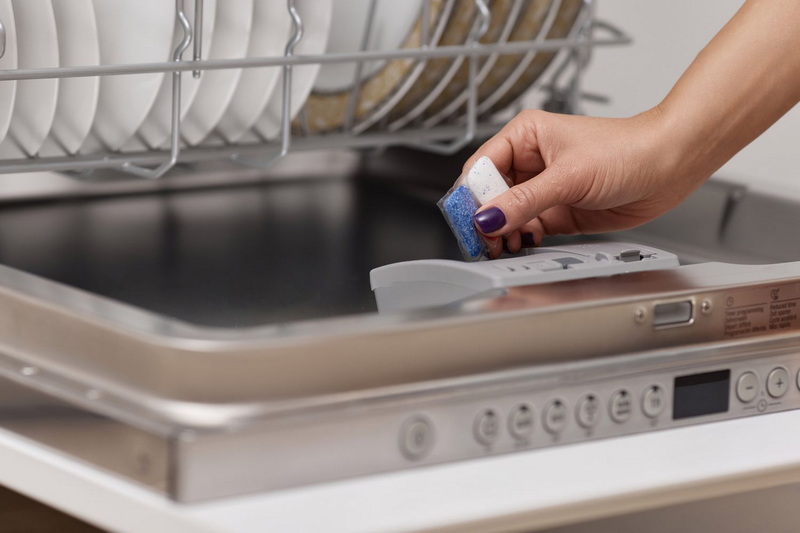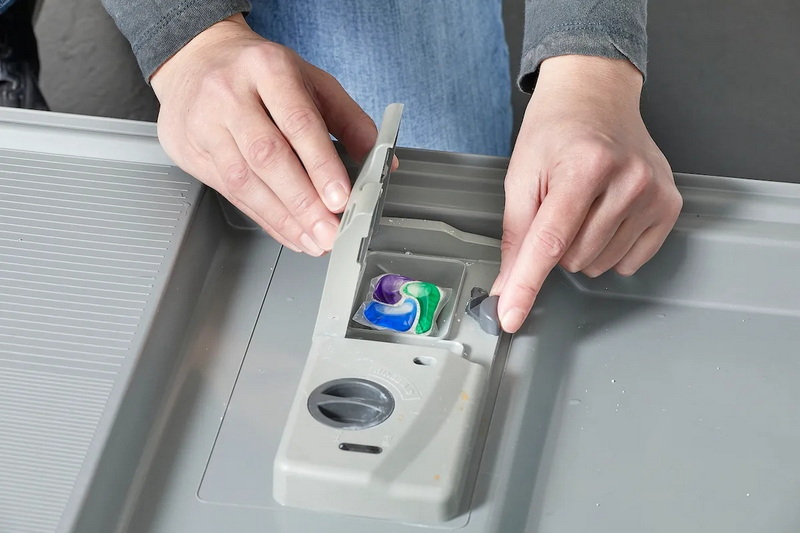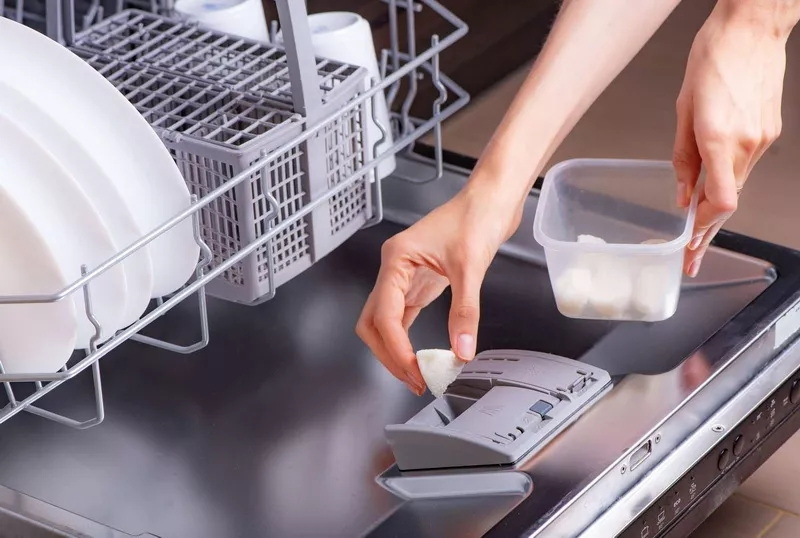Dongguan UFine Daily Chemical Co.,Ltd.
- All
- Product Name
- Product Keyword
- Product Model
- Product Summary
- Product Description
- Multi Field Search
Views: 222 Author: Tomorrow Publish Time: 10-26-2025 Origin: Site











Content Menu
● Understanding How Dishwasher Pods Are Dispensed
● Common Reasons Why Dishwasher Pods Do Not Dispense
>> 1. Dispenser Door is Blocked or Stuck
>> 2. Incorrect Loading of Dishwasher
>> 3. Use of Pod in the Wrong Cycle Setting
>> 4. Moisture in the Detergent Compartment
>> 5. Malfunctioning Dispenser Mechanism
>> 6. Using the Wrong Type or Size of Pod
>> 7. Build-up of Residue Around the Dispenser
>> 8. Detergent Pod Quality and Storage
>> 9. Plumbing and Water Quality Factors
● How to Fix a Dishwasher That Isn't Dispensing Pods
>> Dry the Detergent Compartment
>> Test the Dispenser Door Manually
>> Use Appropriate Cycle Settings
>> Inspect and Repair the Dispenser Mechanism
>> Clean the Dispenser Regularly
>> Consider a Pre-Wash Detergent
● Preventive Maintenance for Proper Pod Dispensing
● Advanced Diagnostics for Persistent Issues
● FAQ
>> 1. How do I know if the dishwasher dispenser door is broken?
>> 2. Can I use regular detergent instead of pods if the dispenser isn't working?
>> 3. Why do dishwasher pods sometimes stick together?
>> 4. What kind of detergent pods are compatible with my dishwasher?
>> 5. How often should I clean my dishwasher detergent dispenser?
A dishwasher pod is a convenient and popular choice for cleaning dishes. However, when your dishwasher does not dispense the pod properly, it can lead to poor cleaning results and frustration. Understanding the reasons behind this issue can help you troubleshoot effectively and restore your dishwasher's performance. This article explores common causes, practical solutions, and maintenance tips to ensure your detergent pod dispenses as it should.

Dishwasher pods are housed in a detergent dispenser compartment that opens automatically during the wash cycle. The dispenser is designed to release the pod at an optimal point to maximize cleaning efficiency. This function relies on:
- The dispenser door mechanism working smoothly.
- Proper loading of dishes, allowing the dispenser door to open fully.
- Correct dishwasher cycle settings that trigger the dispenser.
When any of these conditions are compromised, the pod may fail to dispense. Additionally, understanding the lifecycle of a typical wash cycle helps in diagnosing timing-related dispensing issues. Most modern dishwashers perform several stages: pre-wash, main wash, rinse, and drying. The detergent pod is usually released during the pre-wash or early main wash stage, depending on the model. If you observe that your dishes come out inadequately cleaned, the issue may not only be about dispensing but also about mis-timed release or insufficient agitation in the wash phase. Some models offer an optional pre-wash detergent release, which can complicate the dispensing sequence if the cycle settings are customized.
One of the most frequent problems is the dispenser door being physically blocked by dishes or utensils. If items are stacked tightly near the detergent compartment, the door won't open completely, preventing the pod from dropping out.
Another possibility is the dispenser door latch or spring is broken or jammed, which stops it from opening at the right time in the cycle. In high-use households, daily loading patterns may gradually wear the latch, causing intermittent failures. Visual inspection often reveals if the door sits ajar or does not align with the cavity when closed.
Improper loading can interfere with the dispenser door's operation. Overloading the dishwasher or placing tall items next to the dispenser can block the door. Ensuring proper spacing and avoiding obstruction near the detergent compartment is key. Also, large amounts of food debris stuck to the bottom of the dishwasher can migrate toward the dispenser area over time, potentially jamming the path.
Dishwasher pods are usually designed to dissolve during the main wash cycle. If a short or rinse-only cycle is selected, the pod may not dissolve or dispense correctly. Verify that you are using the proper cycle for pod-based detergents. Some cycles require a longer dwell time or higher wash temperature to fully activate the pod's coating and release.
Dishwasher pods are coated with water-soluble film, sensitive to moisture. If the detergent compartment is damp or wet before starting the washer, the pod can become sticky and clog the dispenser mechanism. This can prevent the pod from releasing or dissolving properly. Over time, humidity can also degrade the integrity of the pod, causing it to crumble inside the dispenser.
Sometimes, the dispenser's internal components such as the latch, spring, or motorized release can malfunction. If these parts do not work as intended, the dispenser may not open to release the pod. In some models, a tiny microcontroller governs the release timing; firmware glitches or sensor failures can lead to sporadic dispensing problems that repeat across cycles.
Pods designed specifically for dishwashers usually fit in the dispenser well. Using pods that are too large, too small, or not meant for your dishwasher model can cause dispensing issues. Always use compatible pods recommended by the manufacturer. Some brands offer multi-chamber pods intended for specific cycle types; using a generic pod might misalign with the dispenser mechanism.
Detergent, food debris, or hard water residue can accumulate around the dispenser door or latch over time. This build-up can prevent the door from opening smoothly, causing pod dispensing failure. Mineral deposits can also stiffen moving parts, reducing the range of motion of the door.
Low-quality pods or those exposed to humidity during storage can degrade, causing partial dissolution or premature softening. Storing pods in a dry, cool place and using fresh pods within their shelf life helps maintain consistent performance. Some pods include moisturizing agents that can leave a film inside the dispenser if the pod is not fully dry.
In rare cases, poor water temperature or low water pressure can affect pod dissolution. If the water temperature remains below the recommended range, the pod may not dissolve completely, leading to improper dispensing. Very hard water may interact with the detergent more aggressively, creating mineral buildup that clogs the dispenser over time.

Open your dishwasher and inspect the detergent compartment. Remove any dishes or utensils blocking the dispenser door. Always load dishes according to your dishwasher's manual to avoid blocking the dispenser. If you notice small items like lids or silverware near the door, relocate them to prevent interference.
Make sure the detergent area is dry before placing the pod. Wipe out any moisture or residue inside the dispenser with a dry cloth to prevent pods from sticking. Consider leaving the door open for a few minutes after a cycle ends to allow any residual moisture to evaporate.
Try opening and closing the detergent compartment door by hand. If it sticks, check for debris or damage. Clean around the latch and hinges thoroughly. If the door feels loose or wobbly, the hinge screws may need tightening or replacement.
Choose dishwasher cycles recommended for pods, generally the “normal” or “heavy wash” cycles. Avoid rinse-only or quick wash cycles when using pods. For tougher soils, select a longer cycle with higher temperature to promote pod dissolution and dispersion.
If the dispenser latch or spring is broken, consult your dishwasher's service manual to order replacement parts or hire a professional technician for repair. Some models provide access panels to inspect the dispenser interior; follow safety procedures to disconnect power before attempting any repair.
Remove residue buildup from around the dispenser using a soft brush and mild detergent. Regular cleaning improves dispenser function. Pay attention to the interaction between the latch and the door edge, as residue there is a common sticking point.
Ensure you are using pods suitable for your dishwasher and the dispenser compartment size. Avoid generic or oversized pods. If you recently changed brands, try a different pod type to see if the issue persists, which may indicate a compatibility problem.
In some models, adding a small amount of pre-wash detergent separately can help if the main pod struggles to dissolve due to water temperature or cycle duration. This should be used sparingly and according to manufacturer guidelines to avoid over-suds or residue.
- Regularly clean the detergent dispenser and surrounding area.
- Load dishes with dispenser clearance in mind.
- Use the proper cycle settings for pods.
- Check for any signs of dispenser wear or damage.
- Avoid letting moisture accumulate in the detergent compartment.
- Run periodic clean cycles to remove mineral buildup.
- Inspect the detergent storage area for humidity and seal the container after each use.
If dispensing fails persist after performing the routine checks, consider these deeper diagnostic steps:
- Run a diagnostic cycle if your model includes one, which can test the dispenser motor and sensors.
- Check the water inlet valve and heater to ensure adequate water temperature and flow, as insufficient pre-wash agitation can hinder pod release.
- Use a test pod from the manufacturer to see if variation in pod formulation affects release timing.
- Review the dishwasher's error codes if present; a fault code related to the dispenser or control board can guide professional service.
When your dishwasher stops dispensing pods properly, it usually results from blocked dispenser doors, improper loading, moisture in the detergent compartment, malfunctioning dispenser mechanisms, or unsuitable pod types. By carefully loading the dishwasher, keeping the dispenser dry and clean, selecting the right wash cycle, and maintaining the dispenser components, you can restore reliable pod dispensing and optimal dishwashing performance. Regular maintenance and mindful loading patterns reduce recurrence and extend the lifespan of the dispenser system. If problems persist after performing the outlined steps, consult the manufacturer's support resources or a licensed technician for a precise diagnosis and repair plan.

If the door does not open during the cycle or feels loose when you manually open it, the latch or spring may be broken. Listen for unusual sounds or check if the door stays closed properly.
Yes, you can use powder or liquid detergent placed directly in the detergent cup if pods are not dispensing, but make sure to adjust the amount according to your dishwasher instructions.
Moisture exposure in the dispenser or storage can cause pods to clump. Always store pods in a dry place and keep the detergent compartment dry before use.
Use pods recommended by your dishwasher manufacturer or those that match the dispenser size and function type (e.g., rinse aid included or not).
Clean the dispenser and surrounding area at least once a month to prevent build-up that might interfere with dispenser functionality.